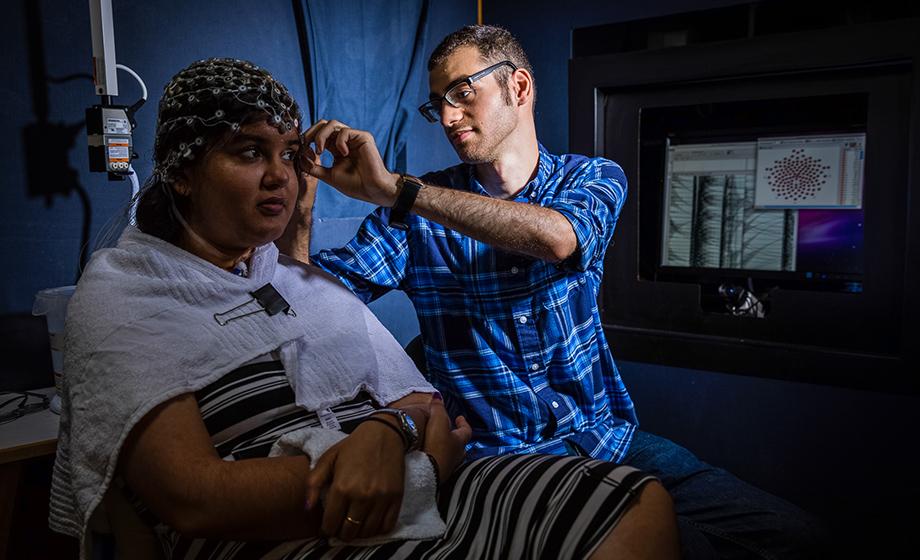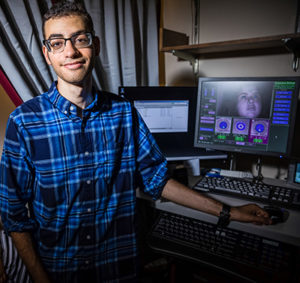Psychology major works on eye-opening study about autism

In just three years at Clark University, Sherief Eldeeb ’18 has completed significant research projects in psychology. He’s examined topics ranging from the disparities in mental health care for Arab-Americans, to sleep problems and attention issues in children with autism spectrum disorders (ASD).
About Sherief Eldeeb ’18
Major: Psychology
Minor: Biology
Hometown: South Windsor, Conn., for high school; now, Harrisburg, Pa.
This fall, as part of a Steinbrecher Fellowship and the Simon and Eve Colin Undergraduate Creativity Award in Psychology, Eldeeb will work with Kymberlee O’Brien, assistant teaching professor in the Health Psychology Lab at Worcester Polytechnic Institute; he’s examining the efficacy of brief mindfulness interventions on reducing stress and anxiety using psychological and physiological measure. The project, part of Eldeeb’s honors thesis, emerged from an Experimental Methods course he took last year at Clark. His thesis advisers include O’Brien and Kathleen Palm Reed, associate director of clinical training and research associate professor of psychology at Clark.
“My research projects at Clark have allowed me to explore various areas, and measures, of psychology, and ensured me that I am making an informed decision about my future,” Eldeeb says. “I have worked on all stages of a research project — from conceptualization and recruitment of participants, to the dissemination of results at conferences.”
This summer, as part of his Clark LEEP project at the University of Washington’s Bernier Lab, Eldeeb worked with a team of researchers to examine two samples: sleep patterns of 1,300 children and teens diagnosed with autism (as reported by their parents), and the electroencephalogram (EEG) readings of 80 such children. In both samples, the children ranged from ages 8 to 17, with about 65 percent experiencing sleep problems.
“I was really interested in clarifying some of the mixed trends in the literature regarding the relationships between age, cognitive ability, sleep problems, and attention in ASD children,” he says.
The researchers found “that both age and cognitive ability showed no significant relationship with sleep problems, but both were related to attention. Children with autism who experienced any type of sleep problem displayed worse attention than those without sleep problems. This is really interesting because both sleep and attention have been separately linked to core symptoms of autism, such as social skill deficits, and this was one of the only studies of this size that supported this connection.”
As part of his summer project, Eldeeb worked on the Autism Biomarkers Consortium for Clinical Trials, a collaboration with the University of Washington, Yale, Duke, Harvard and UCLA.

“I gained some hands-on experience in working with children with autism, and was formally trained as a behavioral assistant to assist with eye-tracking and EEG sessions,” he says. “I sat in on site-calls between the five locations, and observed what goes into making a multi-site clinical trial run smoothly.”
Through the summer, he “began to build relationships with figures at the head of autism research and saw what it takes to get there at every step of the way.”
This was the third consecutive summer of research for Eldeeb. He has worked with researchers at Penn State College of Medicine, examining the effects of dopamine, a neurotransmitter in the brain, on nerve cells in people with schizophrenia. He also was involved with a project that studied base activity differences in the brains of mice with autism.
“I love studying psychology for the insights into how we experience our lives, and especially how this differs for those with mental illnesses such as schizophrenia, autism, and anxiety,” he says. “I use the background I have gained from my biology minor to explore how this experience is constructed at the structural level.”
Besides the funded research this fall, Eldeeb will continue to serve as a research assistant to Johanna Ray Vollhardt, associate professor of psychology, who researches the collective psychological impact, and narratives, of victims of ethnic conflict and genocide. He is an editorial assistant for the Journal of Social and Political Psychology, of which Vollhardt is co-editor.
In addition, with Esteban Cardemil, associate professor of psychology, and his graduate student, Kristen Keefe, Eldeeb will be examining the factors that determine whether patients with mental illness seek outpatient care once they are released from the hospital.
Cardemil’s capstone course on mental health disparities particularly had an impact on Eldeeb. For the main assignment, he interviewed a clinician and his four practicum students. His work resulted in a paper, “Understanding and Addressing Arab-American Mental Health Disparities,” published in the most recent Scholarly Undergraduate Research Journal at Clark.
“I love the opportunity at Clark that, if you seek it out, you can actually have a meaningful presence when speaking to professors,” says Eldeeb. “You are not just another face in the crowd as at many larger universities.”
All of these opportunities, he believes, will help him pursue a doctorate in clinical psychology.
“After graduating from Clark, I plan to take a gap year or two working as a research study coordinator to bolster my graduate school applications and gain more applied practice with the research process,” Eldeeb says. “My end goal is to become a clinical psychologist who conducts research using neuroscience and genetics methodologies.”


